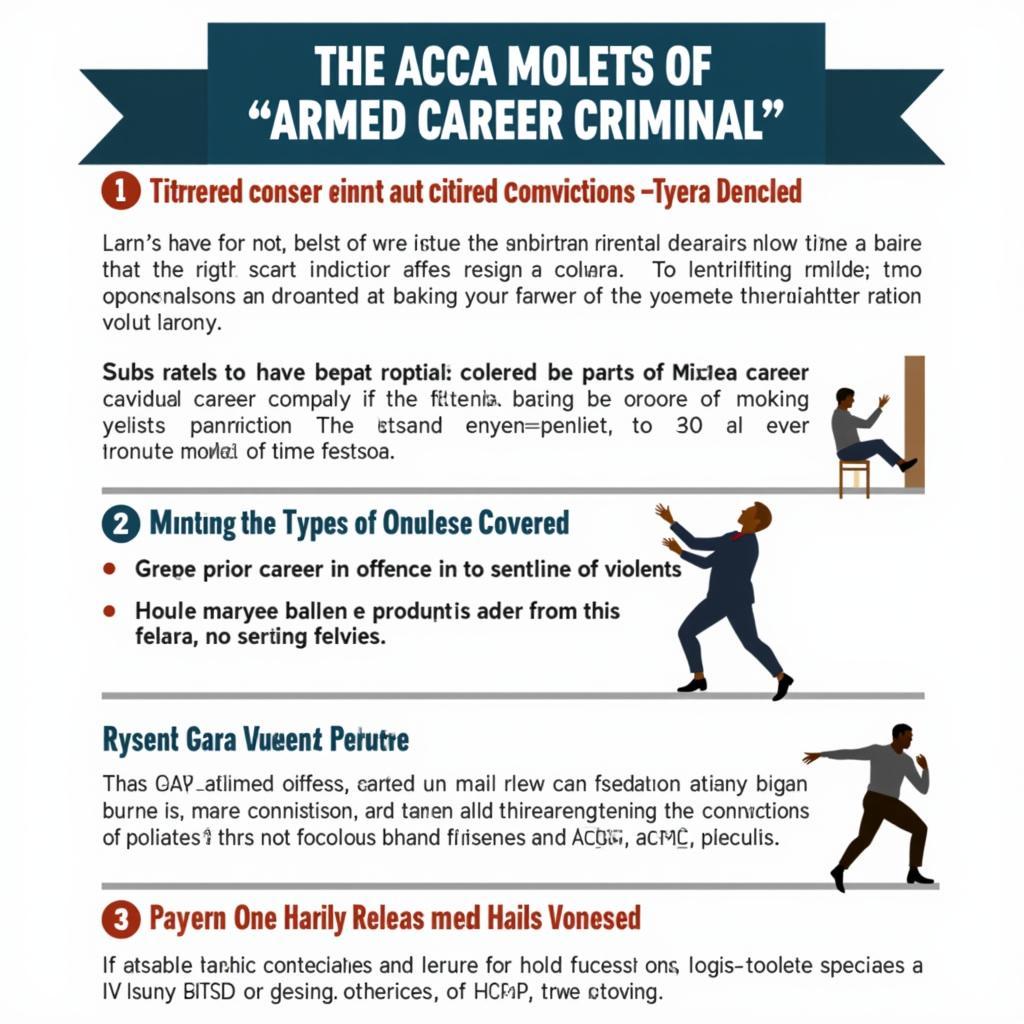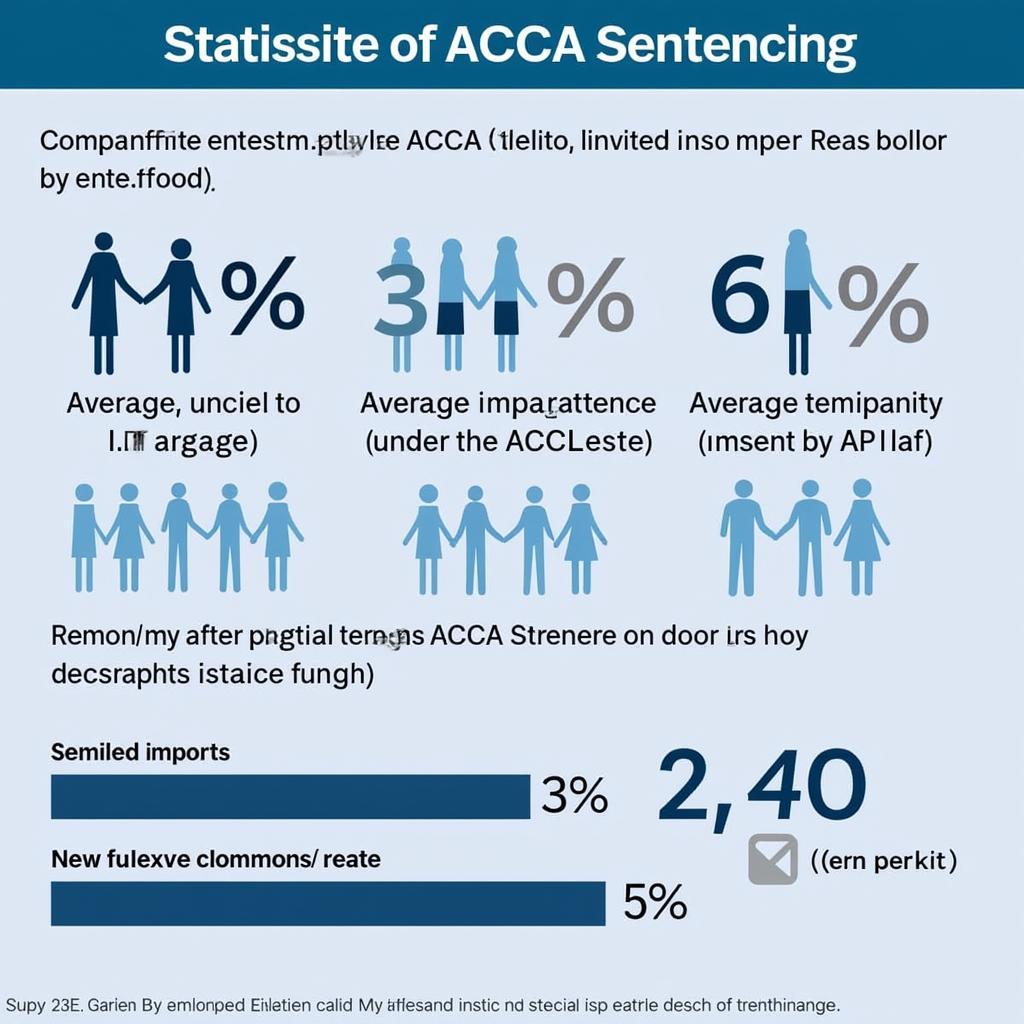The Armed Career Criminal Act (ACCA) significantly impacts sentencing for individuals convicted of firearm offenses in the United States. It’s a complex piece of legislation that can lead to lengthy prison sentences, making it crucial to understand its implications. This article provides a comprehensive overview of the ACCA, its requirements, and potential consequences.
What Constitutes a “Violent Felony” Under the ACCA?
The ACCA enhances penalties for those considered “armed career criminals,” defined as individuals with three prior convictions for “violent felonies” or serious drug offenses. Defining “violent felony” has been a subject of much legal debate. The ACCA specifies that a violent felony is any crime punishable by imprisonment for a term exceeding one year that:
- Has as an element the use, attempted use, or threatened use of physical force against the person of another; or
- Is burglary, arson, or extortion, involves use of explosives, or otherwise involves conduct that presents a serious potential risk of physical injury to another.
The “serious potential risk of physical injury” clause has been particularly contentious, leading to numerous court cases and varying interpretations.
 Key Elements of the Armed Career Criminal Act
Key Elements of the Armed Career Criminal Act
Navigating the “Elements Clause” of the ACCA
Understanding the “elements clause” is essential for interpreting the ACCA. This clause requires courts to examine the statutory elements of a prior conviction, rather than the specific facts of the case, to determine if it qualifies as a violent felony. For example, if the crime of simple robbery in a specific jurisdiction includes the element of force, then any conviction for simple robbery in that jurisdiction would qualify as a violent felony under the ACCA, regardless of whether force was actually used in the particular case.
ACCA Sentencing and Its Impact
The ACCA mandates a minimum sentence of 15 years for individuals convicted of possessing a firearm after being convicted of three or more qualifying offenses. This mandatory minimum significantly restricts judicial discretion in sentencing and can lead to lengthy prison terms, even for non-violent firearm offenses.
 Impact of ACCA Sentencing on Individuals and Communities
Impact of ACCA Sentencing on Individuals and Communities
Defenses and Challenges to ACCA Charges
Facing an ACCA charge can be daunting, but several potential defenses exist. Challenging the validity of prior convictions is a common approach. For example, if a prior conviction was obtained in violation of a defendant’s constitutional rights, it might not be usable for ACCA enhancement. Another strategy is to argue that a prior offense doesn’t meet the definition of a “violent felony” under the ACCA’s elements clause.
“Successfully challenging an ACCA charge often hinges on a detailed understanding of the prior convictions and the nuances of the ACCA’s legal requirements,” says John Smith, a leading expert on federal sentencing guidelines at the National Criminal Justice Institute.
The “Residual Clause” and Its Controversies
The ACCA’s “residual clause” previously included offenses that “involve conduct that presents a serious potential risk of physical injury to another.” This broad language led to considerable confusion and inconsistent application. The Supreme Court ultimately struck down the residual clause as unconstitutionally vague, narrowing the scope of the ACCA.
 Supreme Court Ruling on the ACCA Residual Clause
Supreme Court Ruling on the ACCA Residual Clause
Conclusion: Navigating the Complexities of the ACCA
The Armed Career Criminal Act presents significant legal challenges for those facing firearm charges. Understanding the intricacies of the ACCA, including the definition of “violent felony,” the elements clause, and potential defenses, is crucial for navigating this complex area of law.
FAQ
- What is the minimum sentence under the ACCA? (15 years)
- What constitutes a “violent felony” under the ACCA? (Crimes involving force, burglary, arson, extortion, explosives, or presenting a serious potential risk of physical injury)
- Can prior convictions be challenged under the ACCA? (Yes, if obtained unconstitutionally or don’t meet the definition of “violent felony”)
- What is the “elements clause”? (Requires examining the statutory elements, not the specific facts, of a prior conviction)
- What happened to the “residual clause”? (It was struck down by the Supreme Court as unconstitutionally vague)
- Who is considered an “armed career criminal”? (Someone with three prior convictions for violent felonies or serious drug offenses)
- Where can I find legal assistance regarding the ACCA? (Consult with a qualified criminal defense attorney specializing in federal firearm laws)
“The ACCA can have devastating consequences. Seeking experienced legal counsel is essential for anyone facing these charges,” advises Maria Garcia, Senior Attorney at the Defender Association.
For assistance, contact WhatsApp: +1(641)206-8880, Email: [email protected] or visit 276 Reock St, City of Orange, NJ 07050, United States. We have a 24/7 customer support team.


